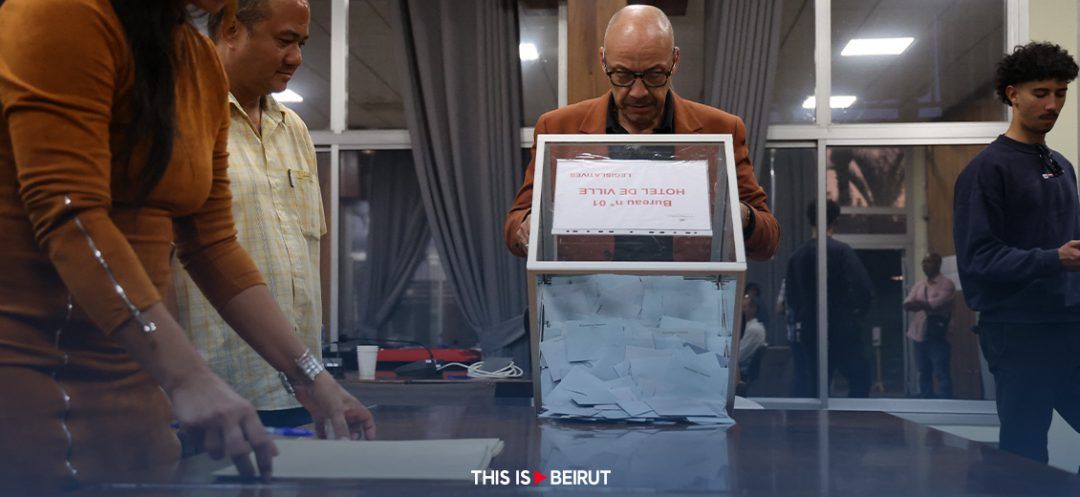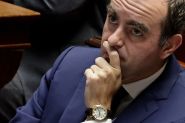- Home
- Middle East
- French Voters Turn Out in Number as Far Right Eyes Power

©(Richard BOUHET / AFP)
French voters turned out in number on Sunday for the second round of a historic election that is expected to leave the far right as the biggest force in a deeply divided parliament.
At midday, according to interior ministry figures, some 26.63% of voters had turned out for the high-stakes poll — the highest number at that time since 1981.
At 5pm, it stood at 59.71% in mainland France, up slightly on the first round last week (59.39%), and almost twenty points higher than the second round in 2022 (38.1%).
The mood in France is tense, with 30,000 police deployed to head off trouble and voters anxious about a potential electoral earthquake shifting the French political landscape.
Initial results were released in a number of overseas territories, which in no way suggest a national trend.
In Guadeloupe, Martinique, and French Guiana, the left-wing won a grand slam, while in New Caledonia, where voting took place without notable incident after the May-June riots, a pro-independence politician was elected for the first time since 1986.
A hung parliament with a large eurosceptic, anti-immigration contingent could weaken France's international standing and threaten Western unity in the face of Russia's invasion of Ukraine.
European Union officials, already learning to deal with far-right parties in power in Italy and the Netherlands, are watching France closely.
[readmore url="https://thisisbeirut.com.lb/world/269924"]
In Rome, Pope Francis chose the day of the French vote to warn against "ideological temptations and populists," adding, "Democracy is not in good health in the world today."
With the country on tenterhooks, last week saw more than 200 tactical-voting pacts between center and left-wing candidates in seats to attempt to prevent the RN from winning an absolute majority.
This has been hailed as a return of the anti-far right "Republican Front," first summoned when Le Pen's father Jean-Marie faced Jacques Chirac in the run-off of the 2002 presidential elections.
Opinion polls now forecast that the RN will fall well short of the 289 seats needed for an outright majority in the 577-seat National Assembly while still becoming the largest party.
Such an outcome could allow Macron to possibly build a broad coalition against the RN and keep Gabriel Attal as prime minister on a caretaker basis.
But it could also herald a long period of paralyzed politics in France as it prepares to host the Olympics from July 26.
The final opinion polls published by two organizations on Friday projected the RN would win between 170 and 210 seats, followed by the New Popular Front's (NFP) broad left-wing coalition on 145 to 185 and Macron's centrists on 118 to 150.
While Macron's Ensemble alliance is forecast to come in third, the more successful NFP is a fragile mix of several warring factions, ranging from traditional Socialists to the hard-left France Unbowed (LFI) of firebrand Jean-Luc Melenchon.
"France is on the cusp of a seismic political shift," said analysts at the European Council on Foreign Relations (ECFR), warning that even if Macron controlled the government after the election, he would face "legislative gridlocks."
This would weaken "France's voice on the European and international stage."
After voting began on Saturday in France's overseas territories, polls opened in mainland France at 06:00 GMT and were due to close by 18:00 GMT.
Projections, which usually give a very close idea of the final outcome, are published shortly afterwards, with the political leaders then reacting rapidly to any frenzy that grips the nation.
Dave Clark, with AFP
At midday, according to interior ministry figures, some 26.63% of voters had turned out for the high-stakes poll — the highest number at that time since 1981.
At 5pm, it stood at 59.71% in mainland France, up slightly on the first round last week (59.39%), and almost twenty points higher than the second round in 2022 (38.1%).
The mood in France is tense, with 30,000 police deployed to head off trouble and voters anxious about a potential electoral earthquake shifting the French political landscape.
Left-Wing Leads Overseas
Initial results were released in a number of overseas territories, which in no way suggest a national trend.
In Guadeloupe, Martinique, and French Guiana, the left-wing won a grand slam, while in New Caledonia, where voting took place without notable incident after the May-June riots, a pro-independence politician was elected for the first time since 1986.
A hung parliament with a large eurosceptic, anti-immigration contingent could weaken France's international standing and threaten Western unity in the face of Russia's invasion of Ukraine.
European Union officials, already learning to deal with far-right parties in power in Italy and the Netherlands, are watching France closely.
[readmore url="https://thisisbeirut.com.lb/world/269924"]
In Rome, Pope Francis chose the day of the French vote to warn against "ideological temptations and populists," adding, "Democracy is not in good health in the world today."
With the country on tenterhooks, last week saw more than 200 tactical-voting pacts between center and left-wing candidates in seats to attempt to prevent the RN from winning an absolute majority.
This has been hailed as a return of the anti-far right "Republican Front," first summoned when Le Pen's father Jean-Marie faced Jacques Chirac in the run-off of the 2002 presidential elections.
Opinion polls now forecast that the RN will fall well short of the 289 seats needed for an outright majority in the 577-seat National Assembly while still becoming the largest party.
'Catastrophic'
Such an outcome could allow Macron to possibly build a broad coalition against the RN and keep Gabriel Attal as prime minister on a caretaker basis.
But it could also herald a long period of paralyzed politics in France as it prepares to host the Olympics from July 26.
The final opinion polls published by two organizations on Friday projected the RN would win between 170 and 210 seats, followed by the New Popular Front's (NFP) broad left-wing coalition on 145 to 185 and Macron's centrists on 118 to 150.
While Macron's Ensemble alliance is forecast to come in third, the more successful NFP is a fragile mix of several warring factions, ranging from traditional Socialists to the hard-left France Unbowed (LFI) of firebrand Jean-Luc Melenchon.
'Weaken France's Voice'
"France is on the cusp of a seismic political shift," said analysts at the European Council on Foreign Relations (ECFR), warning that even if Macron controlled the government after the election, he would face "legislative gridlocks."
This would weaken "France's voice on the European and international stage."
After voting began on Saturday in France's overseas territories, polls opened in mainland France at 06:00 GMT and were due to close by 18:00 GMT.
Projections, which usually give a very close idea of the final outcome, are published shortly afterwards, with the political leaders then reacting rapidly to any frenzy that grips the nation.
Dave Clark, with AFP
Read more



Comments